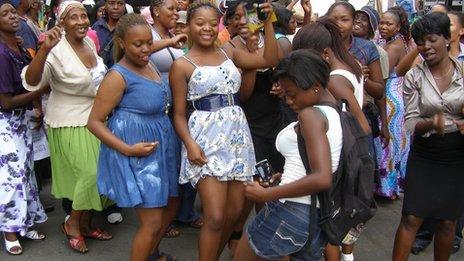Letter from Africa: Miniskirts and morals
- Published
- comments

In our series of letters from African journalists, film maker and columnist Farai Sevenzo considers plans to ban miniskirts in Uganda.
April has given us a clutch of anniversaries and the usual mix of anxieties dressed as news.
South Africa turned 19, Zimbabwe turned 33 and we wondered what would become of Mali as it was decided a UN peacekeeping force would take over from the French, while the French themselves had an embassy bombed in Libya and Somalia's al-Shabab showed signs of a pulse still beating in its violent heart.
African athletes won a couple of international marathons and Kenya's new cabinet had a woman defence minister for the first time and more was said by financial analysts about the rapid economic growth on the continent.
You would think, then, as an Africa watcher that the usual mix of information filled the newspapers and cyberspace with the political and financial.
But a quick glimpse of the press in Uganda showed us that the month of April was also about "integrity and ethics" because Simon Lokodo, Uganda's ethics and integrity minister, was railing against the miniskirt in his preparation of a proposed anti-pornography bill.
"Any attire which exposes intimate parts of the human body, especially areas that are of erotic function, is outlawed. Anything above the knee is outlawed. If a woman wears a miniskirt, we will arrest her," pronounced the minister in a confusing bid to preserve the nation's modesty.
In truth Mr Lokodo has joined a long list of men - for it is usually men - who have taken offence at what women wear throughout independent Africa for decades.

Hastings Banda, Malawi's independence leader, was a stickler for conservative dress
Cultural colonialism
Hastings Kamuzu Banda's Malawi banned the same skirt and frowned at women wearing trousers back in the days when dictatorship was hip and fashionable - Uganda's Idi Amin did not much like that particular skirt either.
An explosion of cultural colonialism in the form of hip-hop, pop, belly dancing, pole dancing, satellite television - which beams the dramas of other lives into African homes and the fashions of a recklessly cool world youth into African minds - has had the likes of Mr Lokodo scrambling to hold back the waves of moral corruption he imagines are coming his way.
Mr Lokodo's Anti-Pornography Bill has not defined "pornography" as we may or may not encounter it on the streets of Kampala, nor does it tell us what his ministry intends to do about the very real pornography available at the touch of a cursor on the World Wide Web of which Uganda is a part.
Yet to be fair to the minister of ethics and integrity, a far more insidious vice than women's summer wear has been arriving in African cities, and by chance, in 2012, Kampala police arrested a foreigner who had been recording pictures of himself engaging in sexual acts with Ugandan children.
No law existed to give him more than the two years in prison or a 6m Ugandan shilling ($2,318, £1492) fine on offer under the Computer Misuse Act, and the criminal simply paid the fine and was released - only to be hauled back to jail because of the public outcry which ensued. He is to now face a new trial, including charges of indecent exposure.
The huge net of globalisation that has given us Chinese architecture and mobile phone companies of every persuasion that have opened up our capitals, has not been discriminating about who or what comes in to shred our traditional values and corrupt our young.
Some argue pornography leads to increased sexual violence - although others say it does not.
'Objects of attraction'
The Anti-Pornography Bill up for discussion in Uganda says there has been "an increase in pornographic material in the Ugandan mass media and an increase in nude dancing in the entertainment world… One of the dangers pornography poses is that it fuels sexual crimes against women…" and the bill seeks to slap a 10m shilling fine and/or 10 years in jail on anyone who engages in pornography, dirty dancing and minimalist attire.

Last year, South Africans marched in protest against attacks on women in miniskirts
Yet while Minister Lokodo's intentions may have been to protect Ugandans from the morally degenerate, he has taken his very broad assegai (spear) to personal freedoms and ignited the long-running debate about where sexual crimes begin - with the criminals or with victims because of what they are wearing?
Women, he alleged, should not wear provocative clothing and men, he says, are not usually the "object of attraction and can go shirtless" on the beach.
This line of argument gets us all nowhere very fast and fails to acknowledge that people who rape or are driven to drooling uncontrollably at the sight of a female thigh with which they are not well acquainted are provoked only by the demons in their own heads and pander to their basest natures.
As a former Catholic priest, Minister Lokodo would know a thing or two about demons, and know too that the best place to get rid of them is through the church, not via government statutes.
Should prayer fail, there will always be a Ugandan jail. And the miniskirt has very little to do with it.
If you would like to comment on Farai Sevenzo's column, please do so below.